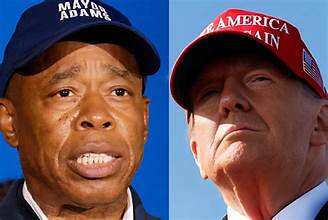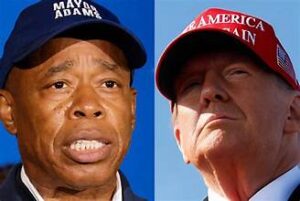Eric Adams case and Trump moves threaten to open corruption floodgates, experts say
Adams case and other Trump moves threaten to open corruption floodgates, experts say
In a series of unprecedented actions, President Donald Trump and his deputies have scaled back or eliminated the government’s tools to ferret out and prosecute corruption, including efforts by foreign actors to interfere in American politics, experts and former officials say.
The administration’s actions, which come after years of mostly bipartisan support for an anti-corruption agenda, have shocked former prosecutors and anti-corruption advocacy groups. They say the administration’s approach threatens to open the floodgates to a surge in corruption in the United States and beyond.
“In his first weeks in office, Donald Trump has taken unprecedented action to invite corruption in the federal government and to undermine the guardrails meant to protect against it,” said a former federal corruption prosecutor, Noah Bookbinder, president of Citizens for Responsibility and Ethics in Washington, a nonprofit organization that says it works to expose corruption by government officials. “This is beyond troubling — it is an emergency,” he added.
RELATED:
New York City Mayor Eric Adams has been indicted, sources say
On Monday, Trump and his administration unveiled three decisions that seemed to symbolize his approach to corruption cases.
That day, Trump signed an executive order pausing investigations and prosecutions of U.S. companies engaged in corruption in foreign countries under a 1977 law, the Foreign Corrupt Practices Act.
And in an Oval Office appearance, he signed a full pardon for Rod Blagojevich, the Democratic former governor of Illinois who was convicted of soliciting bribes to sell the Senate seat Barack Obama left when he became president. Blagojevich, who once appeared on Trump’s show “The Celebrity Apprentice,” has become a Trump supporter and is being considered for an appointment as U.S. ambassador to Serbia, according to a source familiar with the matter.

The same day, the Justice Department instructed Danielle Sassoon, then the acting U.S. attorney for the Southern District of New York, to drop corruption charges against New York Mayor Eric Adams. Adams is a Democrat, and the charges were brought during the Biden administration, but he has been moving toward Trump on issues like immigration in what had been seen as an attempt to secure a presidential pardon.
A memo ordering that the charges be dropped specifically mentioned that the prosecution meant Adams didn’t have a security clearance and therefore couldn’t do some work with the administration on immigration enforcement. Adams has said he “did nothing wrong.”
Sassoon and multiple senior Justice Department officials resigned Thursday rather than carry out the order to drop the charges.
The White House and the Justice Department didn’t respond to requests for comment.
The administration previously made other moves that place a lower priority on corruption cases and scaled back the grounds to launch prosecutions. The Justice Department said it will limit the enforcement of a law designed to expose secret lobbying by foreign governments, the Foreign Agents Registration Act. It also disbanded a Justice Department unit that prosecuted large-scale corruption by foreign governments or their allies who use the U.S. financial system to launder their stolen gains. The efforts, including the Kleptocracy Asset Recovery Initiative, have resulted in the seizure of hundreds of millions of dollars.
Coinciding with the shift on anti-corruption cases, the Trump administration has sought to undermine or ignore government offices Congress created in the aftermath of the Watergate scandal in the 1970s to check abuse and corruption inside federal agencies. Trump has fired 18 inspectors general, who probe possible fraud and abuse across the government.

He dismissed the head of the Office of Government Ethics, which reviews possible financial conflicts of interest for high-level officials, as well as the head of the Office of Special Counsel, which is supposed to protect federal government whistleblowers from retaliation. Those moves are being challenged in court.
Anti-corruption advocates said the new Justice Department policies were all the more worrying given the potential conflicts of interest posed by Trump’s global network of businesses, including a cryptocurrency venture, and his top adviser Elon Musk’s business operations overseas and his companies’ large federal contracts.
RELATED:
Trump’s prosecution is unprecedented in US – but other countries have prosecuted former leaders
The administration has said that Trump removed himself from his real estate business to run for office and declined to receive a presidential salary and that he could earn more money if he stayed out of politics. It also says Musk, whose companies have billions of dollars in federal contracts, is following all relevant laws as a government employee.
“The new guidance on the scaling back of enforcement of both the Foreign Corrupt Practices Act and Foreign Agents Registration Act at a time when the president and his lead advisor Elon Musk continue to have significant financial entanglements with foreign interests, is the equivalent of putting up a neon sign telling foreign actors ‘we are open for corruption,’” Danielle Brian, executive director of the Project on Government Oversight, a nonpartisan government watchdog group, said by email.
Alberto Gonzales, who was attorney general in former President George W. Bush’s administration, said it was “disappointing” that anti-corruption efforts appeared to be a lower priority under Trump.
“It’s not the direction that I think that I would go,” he told NBC News.
Republicans claim they’re stopping weaponization
Trump has for decades been a critic of the Foreign Corrupt Practices Act, the anti-bribery law, saying it put U.S. companies at a disadvantage abroad.
“It sounds good on paper, but in practicality, it’s a disaster,” he said as he signed the executive order. “It’s going to mean a lot more business for America.”
But anti-corruption organizations sharply disagreed, saying that bribery isn’t a routine practice abroad and that the U.S. law had helped deter corrupt actors. Trump was widely expected to take his current action in his first term, but he was reportedly persuaded not to with an argument about how the law can actually help U.S. companies.
“U.S. enforcement of the FCPA has long been a gold standard in the fight against corruption. Weakening it will empower wrongdoers and send a dangerous signal that bribery is back on the table,” François Valérian, the chair of Transparency International, a nonprofit anti-corruption organization, said in a statement.
Zack Smith, a senior legal fellow with the Heritage Foundation, a conservative think tank with close ties to the administration, said administration officials are merely reviewing how some corruption laws have been enforced.
Republicans have accused Democrats of interpreting laws too broadly and using criminal investigations — particularly of Trump — to damage GOP candidates and win elections.
“The Trump Administration’s pause in enforcement to review how prosecutions under these statutes have taken place and to review how to proceed are warranted and necessary. This doesn’t mean that wrongdoers will go free,” Smith said by email.

“But it does mean that Attorney General [Pam] Bondi and her staff are taking a close look at how to most effectively use the department’s resources to accomplish that goal,” he added.
The scrapping of a special team at the Justice Department that prosecuted kleptocrats and sought to seize their stolen assets could have damaging consequences, said Alexis Loeb, who was a trial lawyer on some of the cases during her 11-year career at the department.
The cases focused on wide-ranging corruption, with foreign actors moving large sums of stolen money through U.S. banks and properties with the help of enablers in the United States, she said.
“It threatens to open up the U.S. as a safe harbor for foreign corrupt officials,” Loeb said.
In ordering the changes to the Justice Department’s enforcement of the Foreign Agents Registration Act, Bondi said that there were now more “pressing priorities” and that limited resources needed to be directed toward prosecuting drug cartels and transnational crime.
Bondi’s order said criminal charges for violating the act, which requires people to register when they lobby on behalf of foreign nations, will be limited “to instances of alleged conduct similar to more traditional espionage by foreign government actors.” The order adds that prosecutors instead “shall focus on civil enforcement, regulatory initiatives, and public guidance.”
Some former prosecutors and anti-corruption experts said the move appears to undercut the purpose of the FARA law, which was adopted before World War II when U.S. lawmakers sought to counter attempts by Germany’s Nazi regime to secretly bankroll propaganda to keep the United States from entering the war.
“The Foreign Registration Act 1938 was passed to keep foreign dictators from being able to influence the political landscape in the United States,” said Richard Painter, a law professor at the University of Minnesota who was Bush’s chief ethics lawyer and has been a vociferous critic of Trump.
The point of the law, Painter said, was not to address traditional espionage but to “expose the people who were bankrolling publicity campaigns for foreign governments.”
Past prosecutions
The Justice Department has prosecuted both Democrats and Republicans under the foreign lobbying law, but lawmakers from both parties have sometimes complained about how it has been enforced.
The act requires people “engaged in political activities” to“make periodic public disclosure of their relationship with the foreign principal.”
Three recent prosecutions carried out during the Biden administration targeted Democratic politicians — one of them Adams — who were accused of failing to register as foreign agents and acting corruptly on behalf of organizations in Turkey, Mexico and Egypt.
In his first term, Trump pardoned two allies who were found guilty in criminal FARA prosecutions, saying the prosecutions were politically motivated. One of them, his first national security adviser, Michael Flynn, was caught up in a criminal investigation and eventually admitted lying about his work for the Turkish government. The second was one of Trump’s 2016 campaign managers, Paul Manafort, who also pleaded guilty to FARA violations involving Ukraine.
The Justice Department has continued to pursue FARA prosecutions, including some against people with ties to Trump. Last year, Barry Bennett, an unpaid adviser to the 2016 Trump campaign, and his associate Douglas Watts were charged with violating FARA. Both entered into deferred prosecution agreements with the Justice Department, under which they admitted to the allegations and were subject to fines and other conditions in exchange for the charges being dropped.

Gonzales, the former attorney general, acknowledged that every administration has to weigh priorities and resources at the Justice Department and that Trump has made drug cartels and securing the border top objectives.
However, given the size of its budget, the Justice Department should have enough staffing and resources to prosecute the cartels as well as corruption cases, Gonzales said.
“Prosecuting corruption is a vital arrow in the quiver of the Department of Justice. Corruption erodes confidence in our government and government officials, and I think loss of confidence in the rule of law is dangerous,” he said.
_______
NBC News


